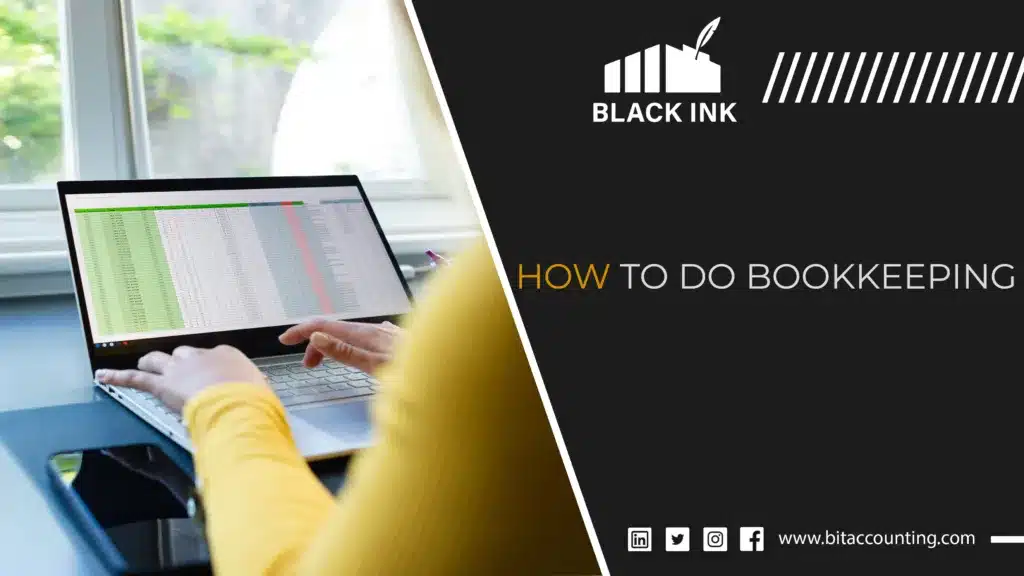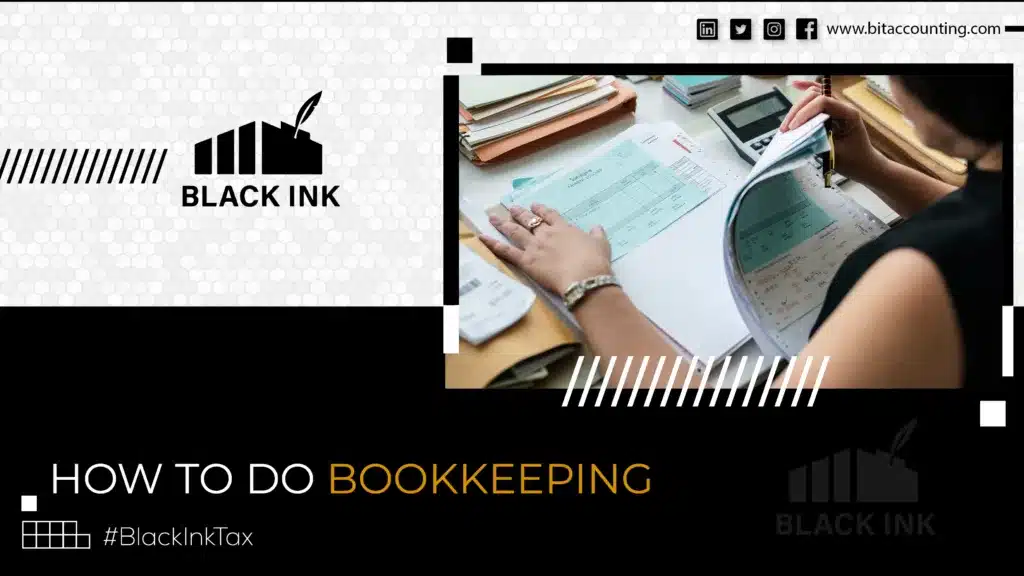
Table of Contents
How to Do Bookkeeping in 2025? We Make It Look Easy
Running a business in 2025 is already a juggling act—AI tools, remote teams, inflation anxiety—now you’ve got to keep the books too? Don’t worry. Bookkeeping doesn’t have to be a dreaded dungeon of spreadsheets. In fact, we’re going to show you how to do bookkeeping with zero accounting degrees, no soul-crushing boredom, and maybe even a little fun. (Yes, we said it.)
Let us tell you more about this, it’s a big topic ofcourse!
What is Bookkeeping (And Why Is Everyone So Uptight About It)?
As members of the taxing community, we know bookkeeping like we started it, so we will explain it as simple as it can be.
Bookkeeping is just a fancy way of saying: “track what’s coming in and going out of your business.”
Think of it like managing your personal bank account—except now it’s your business’s money, and the IRS is watching like a nosy neighbor. You track your sales, expenses, invoices, taxes, and make sure nothing slips through the cracks.
What is Simple Bookkeeping?
Imagine this: you’ve got a shoebox, you stuff it with receipts, and then manually record them into a spreadsheet. That’s simple bookkeeping.
But in 2025, let’s not do it the caveman way. Simple bookkeeping now means:
- Using easy software or websites like BitAccounting
- Categorizing income/expenses (Coffee for clients? Business expense.)
- Saving time with automation (Yes, please!)
Simple, but modern.
Bookkeeping Options for Small Business Owners (No, You Don’t Have to DIY Forever)
Bookkeeping is a must for small businesses, or startups without this, businesses will eventually get ruined, because no one messy work, and you don’t have to DIY it, we know you’ll mess it up.
1. Accounting Software
- Modern
- Automated
- Affordable
Websites like BitAccounting and tools like QuickBooks, FreshBooks, Xero, and Wave are game changers in 2025. They categorize your expenses, reconcile your bank feeds, and even generate reports at the click of a button.
2. External Consultants and Outsourcing
Don’t want to touch the numbers? Hire a pro!
- Freelance bookkeepers: Cost-effective, remote, and scalable.
- Agencies like BitAccounting: Full-service financial partners who handle everything from payroll to tax prep.
How to Start Bookkeeping in a Small Business
Now that we are here, let’s tell you how to start bookkeeping especially for small businesses:
Open The Right Accounts
Don’t mix business and personal! Open a:
- Business checking account
- Business credit card
- Merchant account for payments (Stripe, PayPal, etc.)
Choose A Bookkeeping Method
- Single-entry: Easy, best for solopreneurs.
- Double-entry: More complex but highly accurate. Standard in growing businesses.
Choose An Accounting Method
- Cash basis: Record transactions when money moves.
- Accrual basis: Record transactions when they’re earned/incurred (even if cash hasn’t moved yet).
In 2025, most small businesses stick to cash-based unless they’re scaling rapidly.
Establish Realistic Payment Terms
Net 15? Net 30? Be clear in your invoices. Not everyone pays on time in 2025 thanks to our “great” economy.
Set Up Payroll
If you’ve got a team, pay them on time. Use tools like:
- Gusto
- ADP
- Intuit Payroll
They handle everything from salaries to tax withholdings.
How To Do Bookkeeping for a Small Business (Step-by-Step)
Now that we have started bookkeeping, let’s tell you how to really do it like a pro.
1. Keep Your Receipts
Whether digital or physical, keep all proof of transactions.
2. Keep a Ledger
This is your business diary. Use a spreadsheet or an app to record:
- Income
- Expenses
- Payments
- Refunds
- Tax withholdings
3. Create Financial Reports
Monthly or quarterly, don’t skip it. Key reports include:
- Profit and Loss (P&L)
- Balance Sheet
- Cash Flow Statement
Your future self (and accountant) will thank you.
4. Proactively Handle Tax Liabilities
Track sales tax, estimated tax, payroll tax—and don’t wait until April to care.
Become Familiar with Bookkeeping Statements
Income Statement
Shows revenue and expenses—like, are you making money or bleeding cash?
Balance Sheet
Assets, liabilities, equity. A snapshot of your financial health.
Chart of Accounts
Think of it like your business’s map. Categories for every kind of transaction. Super helpful for tax time and reporting.

Is Bookkeeping in Demand in 2025?
YES, more than ever before.
The demand for bookkeeping services in 2025 is not just steady—it’s accelerating. As the business landscape transforms with the rise of remote-first companies, digital nomads, solo entrepreneurs, and micro-startups, the need for accurate financial tracking, tax-ready records, and compliance has become critical. Bookkeeping, once seen as a background administrative task, is now a frontline necessity for financial clarity and operational sustainability.
Let’s explain more:
1. Remote Businesses:
Remote work and hybrid models continue to grow, requiring skilled bookkeeping specialists for multi-currency transactions, distributed payroll, and cloud-based revenue streams.
2. For Creator:
The creator economy is expected to reach $480 billion by 2027, requiring bookkeepers for tax compliance, revenue tracking, expense management, and tax strategies to maximize income.
3. Micro Startups:
Lean startup models require tight budgeting, cost control, and virtual bookkeepers to help entrepreneurs stay IRS-compliant and focused on growth.
4. The IRS Isn’t Getting Any More Chill:
IRS scrutinizes small businesses, gig workers, and digital incomes, focusing on 1099-K reporting thresholds and missed deductions. Bookkeepers serve as a defensive layer against IRS trouble.
5. Automation:
Automation tools like Wave and Bench are popular, but human brains are still needed for rules, inconsistencies, and insights in 2025’s bookkeeping evolution.
6. Startups:
A bookkeeper, often an industry-specialized one, is responsible for inventory tracking, COGS analysis, merchant fee reconciliation, and sales tax management in businesses like Shopify, Amazon, or WooCommerce.
7. Fractional CFOs:
Bookkeeping is crucial for higher-tier financial services, accounting, CFOs, and advisors, as it provides accurate insights, credibility, and is often bundled with outsourced services.
A Real Example Of One Our Satisfied Clients
A true story from a happy satisfied client:
“I highly recommend this accounting firm for all your needs! Mr. Rehan is an amazing tax professional with an exceptional knowledge. His dedication to my case and his help solved all my issues. I have been to H&R Block and other accountants in the past, only to find disappointment. And ever since I was introduced to Mr. Rehan, my tax issues have been minimized to obsolete and not only this, but he also helped me with my credit score and in other legal matters. Thank you sir and I’m your permanent customer!”
— Kamran J – Local Guide
How to Budget for Bookkeeping Services
You can go from $0 (DIY) to $5,000/month (full service), yeah it sounds a little too much but it comes with its benefits and factors:
- Business size
- Complexity
- Number of transactions
- Payroll requirements
- Tax prep needs
Start small. Scale as you grow. Most small businesses spend $300–$500/month for good.
What Bookkeeping Mistakes Should Small Businesses Avoid?
- Mixing accounts
- Not backing up data
- Ignoring receipts
- Forgetting tax deadlines
- Waiting until year-end to get organized (don’t be that person)
Simplify Your Small Business Bookkeeping with BitAccounting
Too busy for numbers? Or just don’t have the mental energy to do it yourself? Let BitAccounting take over, and be in peace. Whether you need basic monthly tracking or full-blown CFO services, our experts handle:
- Software setup
- Tax prep
- Payroll
- Real-time financial dashboards
Seriously. You focus on the business, we’ll handle the books.
Is Bookkeeping a Good Job to Pursue?
If you love structure, spreadsheets, and helping people make sense of money—yes. Bookkeepers are in huge demand, especially with the rise of remote-first companies and freelancers.
Average salary in 2025: $55,000–$75,000/year
Freelancers? Even more if you build a niche clientele.
Bottom Line
Bookkeeping in 2025 isn’t just about balancing ledgers—it’s about gaining clarity, staying compliant, and driving business growth. Whether you’re doing it yourself or calling in reinforcements like BitAccounting, staying on top of your books is a non-negotiable.
Start simple. Stay consistent. And whatever you do, don’t wait until tax season.
Want a custom bookkeeping plan that fits your business like a glove?
Visit BitAccounting and let’s talk numbers (without the stress).
FAQs For Bookkeeping
1. Can I do bookkeeping myself?
Yes, you can use tools like Wave or QuickBooks, but getting it done from an expert is more efficient.
2. Do I need to keep physical receipts?
Nope, digital copies are fine as long as they’re clear.
3. How often should I reconcile accounts?
Once a month, at least.
4. Is bookkeeping the same as accounting?
Not exactly. Bookkeeping records transactions; accounting analyzes them.
5. Can I use Excel for bookkeeping?
Sure, but it can get messy as you scale.
6. What’s the difference between cash and accrual accounting?
Cash = when money changes hands. Accrual = when revenue is earned or expenses incurred.
7. Do I need to track mileage and small expenses?
Yes, every penny counts at tax time.
8. When should I outsource bookkeeping?
If you’re spending more time with spreadsheets than customers.
9. What if I miss a tax deadline?
Penalties suck. Talk to a pro ASAP.
10. Is BitAccounting legit?
Yes, and we make bookkeeping way less boring.
GET FREE QUOTE FOR ALL OF OUR SERVICES
Black Ink will send you a free analysis of your current state and what would be the cost of managing either a separate accounting and bookkeeping services or a complete solution across New York, USA. Do get in touch and we will be happy to consult you with our bookkeeping services in NY, New York, USA.
